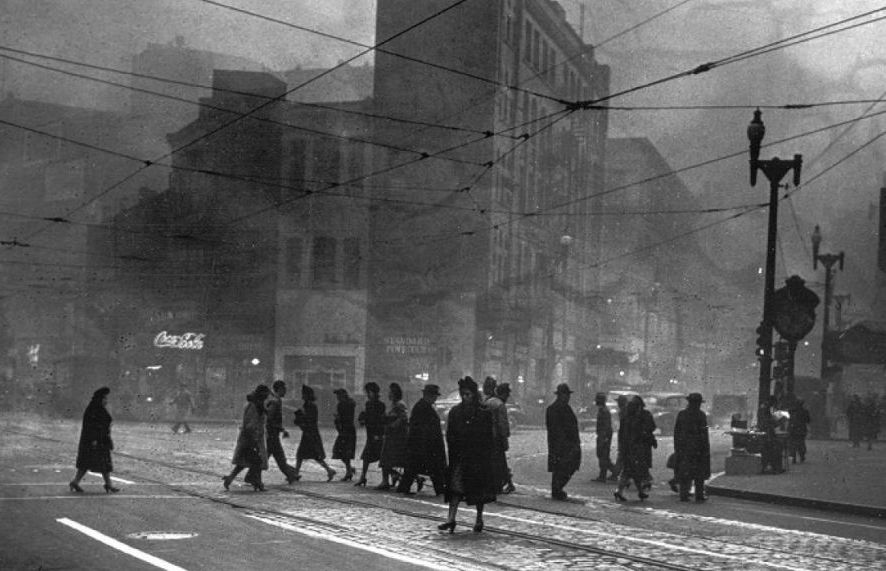
To “purify” the mind doesn’t mean that you become holy or other than you are; it means to strip away that which keeps a person–or a furnace–from functioning best.
Charlotte Joko Beck, Everyday Zen
Obscuring the Hero’s Journey
In Pittsburgh, Pennsylvania, in the early 1940s, soot and smoke so filled the air that residents often had trouble seeing across the street. The pollution was caused by the city’s homes and steel industry burning bituminous or “soft” coal.

Soft coal contains many impurities–hydrogen, sulfur, mercury and even arsenic–that are released when the coal is burned. Soft coal’s counterpart, anthracite or “hard” coal, lacks these impurities and burns hotter and cleaner. However, soft coal is more plentiful and easier to burn, so it is the fuel of choice, despite the pollution it leaves behind.
Connecting pollution in Pittsburgh of the 1940s to our personal Hero’s Journeys may seem a stretch, but there is, in fact, a strong connection. Charlotte Joko Beck makes the connection for us in her 1989 book, Everyday Zen. Beck likens burning soft coal to the way many of us attend to the events in our lives. She writes, “When we burn soft coal, we are misusing our minds so that they are constantly clogged with fantasies, opinions, desires, speculations, analysis–and we try to find right action out of that bog” (p. 35).
[Burning] soft coal simply means that the burning in our life is not clean. We are unable to burn up each circumstance as we encounter it. And the culprit is always our emotional attachment to the circumstances.Charolette Joko Beck, Everyday Zen
Emotional Attachment Clogs our Vision
In other words, we can’t act effectively and thoroughly in our journeys because memories, emotions and fears clog our vision, preventing us from seeing challenges as they really are. As a result, we burn “soft coal.” Our actions leave behind the psychological pollution of unfinished business, so we remain emotionally attached to actions in our past or to anticipations for our future. This attachment causes suffering: guilt, regret, anxiety and fear. Alleviating this suffering triggers the Call to the Hero’s Journey and shapes the challenges we will face on our quest.
For example, we may act with a specific outcome in mind, so our actions are attached to the future. Or we may clog our judgment with worries or fears, so our actions are attached to the anticipation of failure. Sometimes, memories of similar past situations flood our perception, so our actions are clouded by our past. Eastern philosopher Alan Watts explains how this preoccupation with past and future minimizes our mindfulness of the present:
The power of memories and expectations is such that for most human beings the past and the future are not as real, but more real than the present. The present cannot be lived happily unless the past has been “cleared up” and the future is bright with promise (1951, p. 34).
Because we are remembering or anticipating, we can never be fully attentive to the present. We prevent ourselves from acting based on what is real. As a result, we can never “finish” things because we are constantly “burning” the past or the future, burning the soft coal of the “unreal” and creating emotional “pollution” that poisons our lives and inhibits our growth. As Chetanananda writes in Will I Be the Hero of My Own Life?,
The energies that emerge from within and attach us to external things are like lines of force. Even as they emerge, they become something we will eventually have to surrender because only by surrendering them will we be able to grow…the issue is our ability to act without attachment to the outcome of our actions (p. 20).
The Hero’s Journey Releases the Flow
Functioning effectively means acting spontaneously and intentionally in a given situation. It means not getting caught up in analysis and rationalization. It means cleansing our vision and judgment of our biases, fears and memories so that we can see clearly what is in front of us. To function effectively, we must burn the “hard coal” of the present. Our actions must be complete and clean so that they won’t lead to regret, rethinking or resentment later.

The Hero’s Journey addresses this process of “purifying” our minds, of ridding ourselves of emotional baggage from the past and from expectations and fears for the future. The Road of Trials and Abyss “burn” away the emotional pollution that is clouding our vision, obscuring the reality of our lives and preventing us from acting effectively and fully in the moment.
With this emotional and psychological pollution removed, we can emerge from the Abyss transformed, free to act based on what we can be, not what we have been. The Hero’s Journey opens us to opportunities that are newly available. It prepares us to embrace the life we can live and to become the person we can be. As Joseph Campbell wrote in The Hero with a Thousand Faces, “The effect of the successful adventure of the hero is the unlocking and release again of the flow of life into the body of the world” (p. 40).
References
Beck, C. J. 1989. Everyday Zen. San Francisco: Harper and Row.
Campbell, J. 1947. The Hero with a Thousand Faces. Princeton, NJ: Princeton University.
Chetanananda, S. 1995. Will I Be the Hero of My Own Life? Portland, OR: Rudra Press.
Watts, A. 1951. The Wisdom of Insecurity. New York: Pantheon.
This is Good